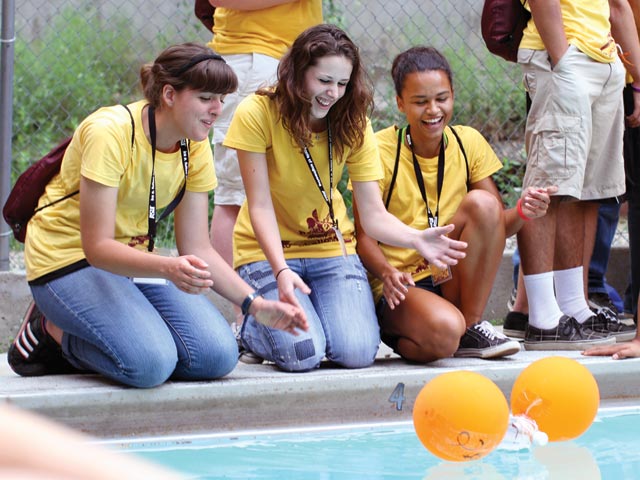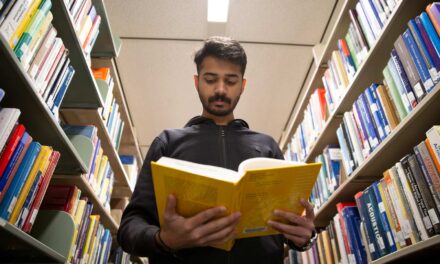
Expanding student support

Engineers from day one: E2 Camp
E2 Camp, our orientation for freshmen, is the first step in our “Engineers from Day One” initiative, and an integral part of our student success strategy.
Our new students participate in team projects, physical challenges, competitions and workshops at a three-day camp held in the mountain town of Prescott, Ariz.
The orientation was designed to create a strong sense of community for our incoming engineering class and reinforce the core concepts of team building and problem solving. Freshmen from the 2009 entering class who attended E2 Camp were retained at a rate of 89.6 percent versus 79.3 percent for non-participants.
Consistent with our increasing enrollment, nearly 1,000 freshmen attended the camps this year.
Engineering residential community
First-year students enrolled in engineering programs have the opportunity to live in our engineering residential community, a smaller campus community within the larger university.
Countless special events, intramural activities and student organizations offer residents opportunities to connect with their academic peers, mentors, faculty and others who share similar interests and classes.
Additionally, the on-campus living and learning environment significantly contributes to a successful transition into the university for freshmen students. It also helps to enrich their academic experience outside the classroom by providing easy access to undergraduate academic support services such as tutoring, workshops, advising and study groups.
Barrett, the Honors College at Arizona State University
Barrett is a selective, residential college that recruits academically outstanding undergraduates from across the nation. Engineering courses with an honors designation provide opportunities for collaboration with faculty on special projects and an expanded understanding of the course subject matter.
In fall 2011, 739 engineering students were concurrently enrolled in Barrett—14.2 percent of all engineering undergraduates, the highest percentage of any school or college at ASU.
Undergraduate research
Many of our students, from freshman to senior level, participate in undergraduate research, exploring solutions to challenges in health, energy, education, sustainability and security.
Our signature program is the Fulton Undergraduate Research Initiative. FURI is designed to enhance and enrich a student’s engineering education by providing hands-on lab experience, independent and thesis-based research and travel to national conferences. Students select, design and complete research projects under the guidance of faculty mentors and present their findings at an annual public symposium.
In 2011, FURI featured 160 research projects attracting 126 participants and over 400 visitors to the semi-annual symposiums. Over 25 percent of the school’s faculty mentored FURI students, with female and underrepresented minority students comprising nearly two-thirds of FURI participants.
Students cite undergraduate research experiences as being extremely valuable and rewarding. Students learn to pursue new knowledge outside of the classroom and textbook, develop confidence in their ability to be creative and innovative and gain insight to what it is like to be a graduate student at a research-intensive university.
Career Exploration Night
The second annual Engineering Career Exploration Night for freshmen attracted over 1,100 students and almost 200 professional engineers as well as other representatives from over 80 companies, government agencies and industry associations.
Such an event is typically geared for juniors and seniors, but Career Exploration Night is a pivotal part of the “reinvention of the first-year experience” under the direction of James Collofello, associate dean and director of Academic and Student Affairs.
Career Center
The Engineering Career Center combines both in-person and online resources that provide career coaching and serve as a single point of contact to connect industry recruiters and job seekers. Not just for graduating seniors, the Engineering Career Center offers a full spectrum of career planning from advising on degree program choices to job negotiation for new entrants to the job market, as well as resources for alumni who may be well into a career.
The engineering internship program is an important part of our commitment to student success. Internships provide technically-trained students with valuable practical industry experience. In turn, employers gain highly-skilled, motivated talent to fill short-term or seasonal needs. Both the company and the student get to know each other and often interns become employees upon graduation. Through both scheduled and drop-in advising, engineering students and alumni have access to advice throughout their careers.
The Engineering Career Center helps with career path planning, preparation of technical resumes and application letters, career fair strategies, job search techniques, interview skills and salary negotiation. The center is also a resource for graduate school application reviews.
Bachelor’s + master’s accelerated programs
In support of a commitment to prepare our students for success in an intensely competitive and global environment, the Ira A. Fulton Schools of Engineering offer high-achieving students an opportunity to earn both a bachelor’s and a master’s degree within five years.
The accelerated curriculum, or 4+1 program, is offered across all engineering academic disciplines and provides eligible students with the option to combine advanced undergraduate coursework and graduate coursework to accelerate graduate degree completion.
Study teams
Beginning in fall 2011, engineering freshmen benefited from an expansion of the highly successful ASU Supplemental Instruction Study Group program that now includes several core engineering courses. The free program is designed to support students of all levels through organized group study.
Study teams are led by specially-trained undergraduate students who previously completed the same course with a high grade. These peer leaders retake the course and facilitate interactive, cooperative learning study teams.
This program is currently used by over 250,000 students every semester in 30 countries and has been used very successfully at ASU for many years, but until now was not available for courses needed by engineering majors.
Unlike tutoring or remedial programs, study teams are designed for all students enrolled in challenging classes. Team leaders do not re-lecture or teach the material; they facilitate cooperative group study and help keep the group on task.
Typical study team participants raise their course grade by half a grade point, on average, and failure rates are cut in half. Students also learn how to study in teams and are often able to continue doing so on their own in later courses. Student retention is often markedly improved.
Fulton Grand Challenge Scholars Program
The National Academy of Engineering (NAE) has identified 14 Grand Challenges for Engineering in the 21st century. These challenges serve to raise awareness and call attention to opportunities to impact and improve our quality of life.
Endorsed by the National Academy of Engineering in February 2009, the NAE Grand Challenge Scholars program is a combined curricular and extracurricular program designed to engage and encourage exceptional students.
The Fulton Grand Challenge Scholars Program combines an innovative curriculum and cutting-edge research experiences with global, entrepreneurial and service learning opportunities, preparing students to solve the grand challenges facing society.
The Ira A. Fulton Schools of Engineering have been selected as the first non-founding partner in the program. Founding schools include Duke University’s Pratt School of Engineering, the Franklin W. Olin College of Engineering and the University of Southern California’s Viterbi School of Engineering.
Fulton students who complete the program achieve the distinction of Grand Challenge Scholar, endorsed by both ASU and the National Academy of Engineering.



































